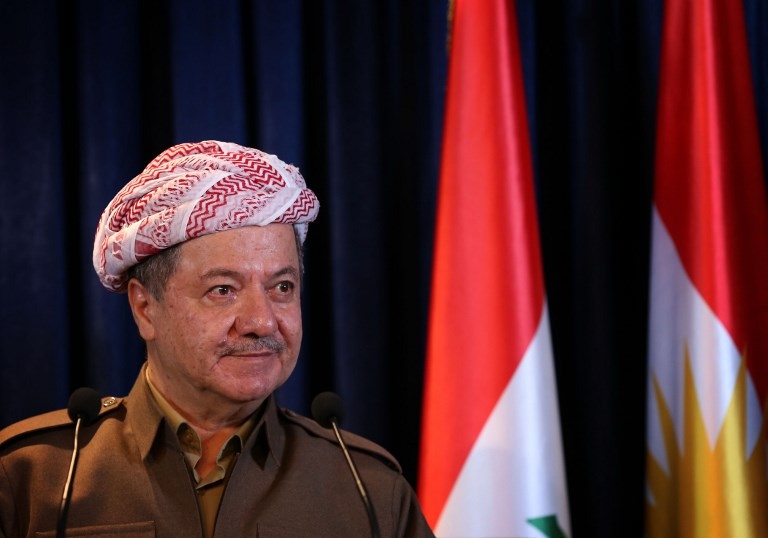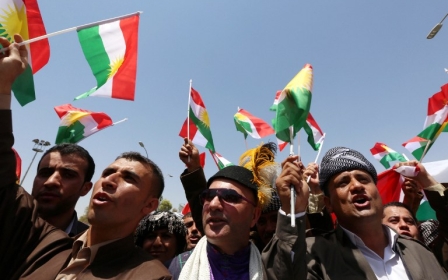Barzani offers to delay referendum if Baghdad agrees to accept outcome

Kurdistan Regional Government (KRG) President Massoud Barzani has said that he may be willing to postpone next month’s referendum on Kurdish independence from Iraq until next year if Baghdad vows to accept the result.
Barzani had conceded last week that he would be willing to alter the date of the poll in exchange for international support, but has now asked for Iraqi government backing.
“Such guarantees should be first from the Iraqi government and the Iraqi parliament, and then with the guarantee of the United States and the international coalition as well as European Union and the United Nations," he said in an interview with Arshaq al-Awsat newspaper on Wednesday.
“Is there a willingness to sign a document that for example on September 25, 2018 to recognise the referendum and accept its results, if the outcome was in support of independence?’ he asked.
“Such an alternative may be considered if offered.”
Barzani also said that though he believes a No vote was unlikely, he would resign should Kurds vote to remain a part of Iraq.
“If the people refused independence, I will respect the will of my people and I will devote myself to my private life.”
If the people refused independence, I will respect the will of my people and I will devote myself to my private life
- Massoud Barzani, KRG president
However, he told the Arabic-language newspaper that he was expecting a high Yes vote in the referendum and referred to a recent rally of 20,000 pro-independence supporters in Cologne, Germany, as an indication of widespread support.
Barzani’s comments come as the international community and the Iraqi government - which see the vote as unconstitutional - scramble to persuade Kurds to call off the September vote.
Barzani rejected an offer from Baghdad earlier this month to postpone the referendum in return for political or financial concessions from Baghdad.
Last month US Secretary of State Rex Tillerson also called for the vote to be delayed, in response to which Barzani said that Iraqi Kurds would “expect guarantees and alternatives for their future" in exchange for such a postponement.
The US and other Western nations fear the vote could ignite a fresh conflict with Baghdad and possibly neighbouring countries, diverting attention from the ongoing war against Islamic State group (IS) militants in Iraq and Syria.
Turkey and Iran oppose the vote over fears that it could stoke their restive Kurdish populations into also seeking independence.
Kirkuk 'definitely' taking part
Yet Barzani will be buoyed by news that the oil-rich ethnically diverse region of Kirkuk - claimed by both the central government in Baghdad and the KRG - will be voting in the September referendum.
The vote is “definitely happening," Kirkuk Governor Najmuddin Kareem told Reuters after a majority of the provincial council voted in favour of taking part.
Kurdish peshmerga fighters seized control of Kirkuk in 2014 when the Iraqi army fled from IS' offensive across northern and western Iraq, preventing the region’s oil fields from falling into the hands of the militants.
There however remain divisions within Kurdish ranks over the referendum, with some including the Gorran movement, an Iraqi Kurdish opposition party with 20 out of 111 seats in the KRG, saying that it amounts to a power grab by Barzani and would be "illegal" if it goes ahead without the support of other parties.
Sinjar has seen repeated clashes between forces loyal to the KRG and forces linked to the Kurdistan Workers' Party (PKK) who oppose the KRG system of government.
The Kurds have been seeking an independent state since at least the end of World War One, when colonial powers divided up the Middle East, but their territory ended up split between modern-day Iraq, Syria, Turkey and Iran.
Stay informed with MEE's newsletters
Sign up to get the latest alerts, insights and analysis, starting with Turkey Unpacked
Middle East Eye delivers independent and unrivalled coverage and analysis of the Middle East, North Africa and beyond. To learn more about republishing this content and the associated fees, please fill out this form. More about MEE can be found here.




